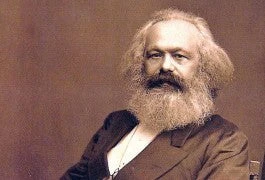
The traditional Marxist view held that countries had to go through various stages of development as the logic of history unfolded – i.e. from hunter-gatherers, to primitive agrarianism, to feudalism, to bourgeois democracy, to socialism and thence communism.
A minority view emerged after the failed 1905 Russian revolution that in some cases there could be a ‘permanent revolution’ - some countries could leap-frog stages – e.g. from feudalism to socialism, as allegedly happened later in the 1917 Russian revolution.
Trotsky – who first advanced the ‘permanent revolution’ view in 1905 – argued that this became possible because of what he called “combined and uneven development”. While it was true that the first wave of industrializing countries had gone through similar stages of development, once they were in existence with their advanced technologies and global reach, they had a profound effect on countries following them.
In a fairly vivid image, Trotsky pointed out that ‘primitive’ people’s don’t have to go through all the stages from spear or bow and arrow to repeating rifle once someone else already has them – they can jump straight from one to the other by importing the technology. But in other respects, their societies would, indeed must, retain many elements of their current material, social and political stage – hence the term “combined and uneven development”.
He argued that the affects of advanced countries on intermediate ones like Russia was to create a strong working class through what we’d now call FDI, and at the same time a weak domestic bourgeoisie, for the same reason. So when the point of revolt against the feudal state arrived, the working classes and not the bourgeoisie would lead the revolution.
Once the workers seized power, they could and should hold onto it and implement socialist changes – skipping over the stage of ‘bourgeois democracy’ entirely. The alternative was a ‘temporary revolution’ in which the workers seized power and then handed it over to the bourgeoisie, hence Trotsky coined the term ‘permanent revolution’ to describe his approach. (Lenin, incidentally, belatedly went over to Trostky’s position in his famous “April Theses” in 1917 and the rest, as they say, is history.)
Modern debates about development have striking parallels with these debates inside the early 20th century Marxist movement.
The equivalent of the ‘stages’ school of thought in public administration and management (PAM) – often associated with Allen Schick’s famous World Bank paper “Why Most Developing Countries Should Not Try New Zealand's Reforms” – argues that emerging economies have to go through the ‘stage’ of rational-legal, Webberian, bureaucracy before they can start adopting advanced ‘technologies’ like New Public Management (NPM).
(NB – to be fair I’m not sure that is exactly what Allen was arguing, but that is the predominant way it has come to be understood).
his view would see emerging countries repeat the processes that Western countries went through in the late 19th and early 20th centuries in establishing democratically responsive, fully functioning, non-corrupt, rational, legally-bound and efficient bureaucracies. In many ways I would argue this appears to have been the dominant view in the World Bank since the turn to ‘institutions matter’ at least since seminal 1997 World Development Report ‘The State in a Changing World’.
Yet, at the same time, there have been those who advocate a ‘permanent revolution’ perspective, in practice if not necessarily in theory. I have often heard the equivalent of the “bow and arrow to repeating rifle” narrative updated to 21st century terms.
The most common example usually cited is the mobile phone – countries without well developed mass telecommunications system do not have to go through the ‘stage’ of laying a copper-wire network across the whole country, as the west did in the early 20th century, but can leap-frog straight to radio-based mobile technologies now it has become so cheap and easy to use.
In PAM reforms I have also seen many examples of attempted import of ‘advanced’ NPM-style reforms into developing and transitional states with, it has to be said, often very mixed results. A decade or so ago, when the fashion for semi-autonomous “agencies” was at its height (and incidentally the WB was promoting ‘agencification’ programs all over the place), I studied some of these and found profound problems with importing the ‘agency’ idea.
My own view is that there is probably something in-between “stages” and “permanent revolution” that draws on the best of both.
To put it crudely, leap-frogging might work for phones, but it doesn’t work for transport - countries still need well-developed road and rail links to have a decent economy. So we need a much more nuanced – and explicit – discussion about when and where we can transfer PAM reforms from one context to another.


Join the Conversation